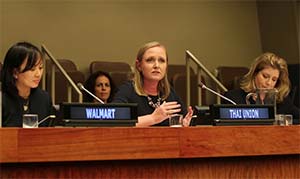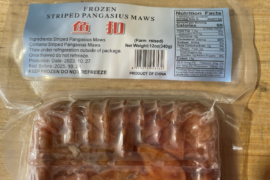In recognition of Thai Union Group’s efforts to combat modern day slavery and forced labor, a representative from the Bangkok, Thailand-headquartered seafood company participated in a high-level panel at the United Nations (UN) General Assembly in New York City on September 24.
 Dr. Darian McBain (middle) of Thai Union outlines ways to tackle the problems of modern slavery and forced labor during a UN General Assembly meeting.Dr. Darian McBain, Thai Union’s global director for sustainable development, was joined by Anbinh Phan, director of global government affairs at Walmart, Kirstine Cooper, general counsel and company secretary at Aviva, and Dan Viederman, managing director at Humanity United. The panelists shared insights and demonstrated lessons learned from their experience on the importance of innovation and partnership between government officials and the private sector to eliminate modern slavery from commercial supply chains.
Dr. Darian McBain (middle) of Thai Union outlines ways to tackle the problems of modern slavery and forced labor during a UN General Assembly meeting.Dr. Darian McBain, Thai Union’s global director for sustainable development, was joined by Anbinh Phan, director of global government affairs at Walmart, Kirstine Cooper, general counsel and company secretary at Aviva, and Dan Viederman, managing director at Humanity United. The panelists shared insights and demonstrated lessons learned from their experience on the importance of innovation and partnership between government officials and the private sector to eliminate modern slavery from commercial supply chains.
Featured government speakers hailed from the UK, USA, Australia, Bahrain, Canada, Bangladesh and Nigeria. Those in the audience included representatives from approximately 300 UN member states, as well as persons from civil society, the private sector, investors and media.
“Governments and businesses must come together to resolve the social challenges plaguing some modern day supply chains – specifically forced labor, slavery and human trafficking,” said McBain. “I genuinely believe success is only fully attainable through authentic political will, multi-party collaboration and resolute, uncompromising determination. This is why it was so important for Thai Union to be able to highlight the initiatives we have taken and lessons we have learned through our SeaChange sustainability strategy, and share that knowledge with the international community at the UN General Assembly.”
Thai Union’s participation brought perspective not only from the private sector, but crucially served as a key voice from Thailand as the nation has started to make advances on its human rights agenda.
Multiple leaders highlighted the importance of the Bali Process Government and Business Forum, an important platform of which Thai Union is a member that enables public and private sector leaders across the Indo-Pacific region to learn from each other’s experiences to eradicate human trafficking, forced labor, modern slavery and the worst forms of child labor. Additionally, Thai Union recently announced its support for the Bali Process Acknowledge, Act and Advance (AAA) Recommendations, set as a pathway for action to achieve Target 8.7 of the UN Sustainable Development Goals (SDGs) and eliminate transnational crimes currently afflicting people throughout the Indo-Pacific region.
“One of the keys to ensuring that Target 8.7 of the SDGs is met is to put worker voice at the heart of combating modern slavery and forced labor,” said McBain. “It is only then that we can know whether or not we’re truly affecting change.”





